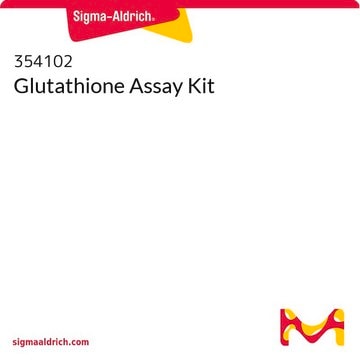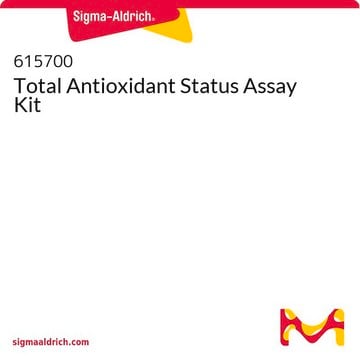38185
Quantification kit for oxidized and reduced glutathione
200 tests
Sinónimos:
γ-L-glutamyl-L-cysteinylglycine kit, Quantification kit
Iniciar sesiónpara Ver la Fijación de precios por contrato y de la organización
About This Item
UNSPSC Code:
12352108
NACRES:
NA.32
Productos recomendados
Categorías relacionadas
General description
Glutathione Quantification Kit is designed to detect oxidized and reduced Glutathione. Glutathione is usually represented in a reduced form called GSH; however, GSH is converted into its oxidized state (GSSG) upon oxidative stress. The ratio between GSH and GSSG is considered an index for oxidative stress. Glutathione, also known as γ-L-glutamyl-L-cysteinylglycine, is a tripeptide compound that is involved in anti-oxidation and drug metabolism. It acts as a substrate for enzymes like glutathione peroxidase, glutathione S-transferase, and thiol transferase.
Application
Glutathione Quantification Kit is used to detect the total amount of glutathione as an index for oxidative stress or disease risk.
Features and Benefits
The detection ranges of total glutathione and GSSG using in this kit are from 0.5 μmol/l to 50 μmol/l and from 0.5 μmol/l to 25 μmol/l, respectively.
Components
Glutathione Quantification Kit contains:
- Enzyme Solution (50µl X 1)
- Buffer Solution (60ml X 1)
- Standard GSH (X 1)
- Masking Reagent (20µl X 1)
- Co-enzyme (X 2)
- Substrate (DTNB) (X4)
- Standard GSSG (X 1)
Analysis Note
Glutathione Quantification Kit contains a GSH masking reagent. This enables GSSG detection in the sample by measuring the absorption (λmax = 412 nm) obtained from a colorimetric reaction of DTNB (5,5’-dithiobis (2-nitrobenzoic acid)) coupled with the enzymatic recycling system. The total quantity of GSH can be measured by subtracting the amount of GSSG from the total amount of glutathione.
Other Notes
not available in Korea, Singapore, Taiwan and Japan
signalword
Danger
hcodes
Hazard Classifications
Eye Irrit. 2 - Flam. Liq. 2 - Skin Irrit. 2 - Skin Sens. 1
Storage Class
3 - Flammable liquids
Elija entre una de las versiones más recientes:
¿Ya tiene este producto?
Encuentre la documentación para los productos que ha comprado recientemente en la Biblioteca de documentos.
Los clientes también vieron
Anna Maria Czarnecka et al.
Nutrients, 12(7) (2020-07-28)
Acute liver failure (ALF) impairs cerebral function and induces hepatic encephalopathy (HE) due to the accumulation of neurotoxic and neuroactive substances in the brain. Cerebral oxidative stress (OS), under control of the glutathione-based defense system, contributes to the HE pathogenesis.
Hidemasa Katsumi et al.
Metallomics : integrated biometal science, 6(5), 1050-1056 (2014-03-25)
Reactive oxygen species (ROS) are involved in the pathophysiology of ischemia/reperfusion injury. To protect mouse hepatocytes from ischemia/reperfusion injury, we prepared two different sizes of citric acid-protected platinum nanoparticles (Pt-NPs), which exhibited ROS-scavenging activities and selective delivery to a specific
Hayato Nakagawa et al.
Cancer cell, 26(3), 331-343 (2014-08-19)
Endoplasmic reticulum (ER) stress has been implicated in the pathogenesis of viral hepatitis, insulin resistance, hepatosteatosis, and nonalcoholic steatohepatitis (NASH), disorders that increase risk of hepatocellular carcinoma (HCC). To determine whether and how ER stress contributes to obesity-driven hepatic tumorigenesis
Hany H Arab et al.
Chemico-biological interactions, 335, 109368-109368 (2021-01-08)
Dapagliflozin, a selective sodium-glucose co-transporter 2 (SGLT2) inhibitor, has featured marked anti-inflammatory effects in murine models of myocardial infarction, renal injury, and neuroinflammation. Yet, its potential impact on the pathogenesis of inflammatory bowel diseases (IBD) has not been previously investigated.
Samuel Coelho Faria et al.
Scientific reports, 8(1), 2850-2850 (2018-02-13)
The antioxidant defense system (ADS) protects organisms against the potential oxidative stress induced by environmental features, underlying processes of habitat diversification. The anomurans Aegla constitute the most threatened freshwater decapods of South America, occupying pristine habitats with narrow distribution. Using
Nuestro equipo de científicos tiene experiencia en todas las áreas de investigación: Ciencias de la vida, Ciencia de los materiales, Síntesis química, Cromatografía, Analítica y muchas otras.
Póngase en contacto con el Servicio técnico










